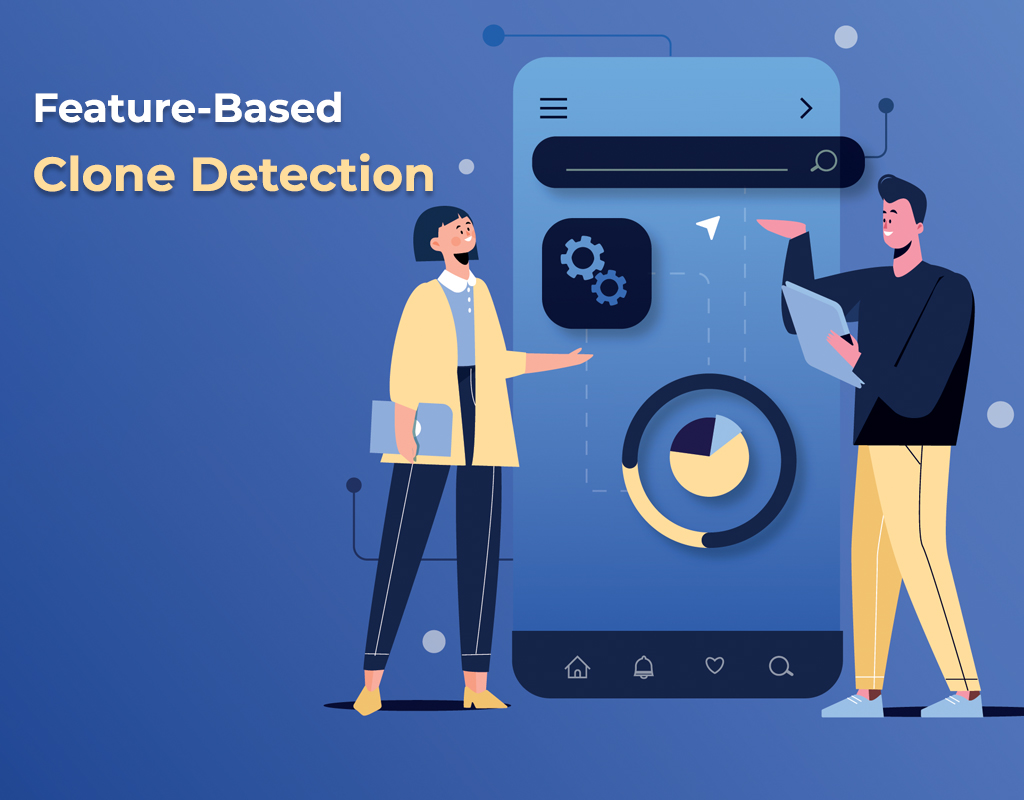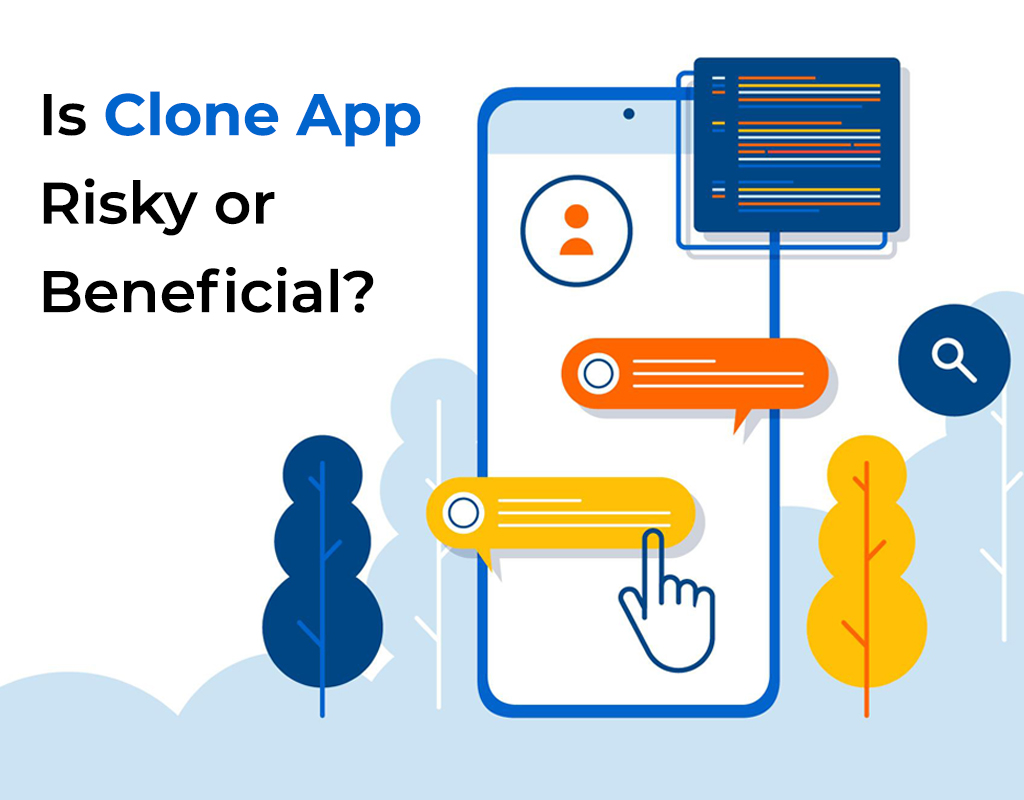Is clone app risky or beneficial?
Mobile apps are the new face of connecting with customers as there are around 2.71 billion smartphones used globally. The mobile app development companies try to latch the chance to succeed in customers directly. The broader the reach of the mobile app, the more its advertisement revenue would be. But, a serious threat of cloned mobile apps is looming around these companies. Many clone app looks and performs in the same manner because the original app hampering its revenue and brand negatively.
H2:- Clone — A Preamble
Let us attempt to understand the meaning of clone apps first. The scope of cloning isn't limited to aesthetics only, but it must cover the code also. Two applications are often considered just like one another once they have an equivalent code, but the businesses owning them are different. Cloning is different from the reusing of code because there are some mobile apps while releasing their API libraries open for access to anybody. If an app has been created by using the publicly available third-party API, it can't be considered cloning. Similarly, multiple versions of an equivalent app can't be termed as clones as their parent company would be equivalent during this case.
H2:- Clone Detection Approaches
So, how can we detect clone apps? An easy approach is to see the private key of the owner of the app as every mobile app has got to be clearly signed by the owner before it's uploaded to the play store. So, the ownership of two similar apps is often verified by checking the key of the apps. If the keys are different, then there are chances that the apps could be clones. This example is pretty common for a mobile app development company in India as companies here are fierce competitors. Allow us to see what the various ways of detecting clone apps are?
H2:- Feature-Based Clone Detection

Hepto Technologies feature-based clone detection approach analyzes the program to extract the pool of features provided by the 2 apps. The extracted features are compared to detect the quantity of plagiarism within the code with the assistance of certain tools available online. The chosen features can differ significantly in terms of variables, class names, number of classes, loops, libraries, and other programming constructs. This approach isn't full proof because it ignores the structural similarities of the programs. These approaches have a coffee clone detection ratio and are highly susceptible to be fooled.
H2:- Structure-Based Clone Detection
Structure-Based-Clone-Detection — Hepto Technologies structure-based clone detection approach converts the programs into multiple tokens generating a stream of an equivalent. These token streams are then compared to detect smart plagiarism wherein the constructs which may be modified with ease like whitespace characters, variables, comments, etc. are ignored. This approach is stronger than the previous approach in detecting structure plagiarism because it can detect similar or nearly similar code. However, the code modifications can't be detected properly because the streams don't have semantic knowledge.
H2:- PDG-Based Clone Detection
PDG-Based-Clone-Detection | Hepto Technologies PDG stands for Program Dependence Graph. It represents the methods within the program via a dependency graph highlighting data also as control dependencies. The sting showing data dependencies is usually between two variables, which are hooked into each other. For instance, a pointer variable v2 pointing to v1 depends on v1. On the opposite hand, an impact dependency edge between two statements exists, if the execution of a press release depends on the real value of another statement. This phenomenon is difficult to cover and is usually ignored by the cloners. This is able to be almost like the first app. So, this is often the foremost robust technique to detect cloning.
H2:- Potential Threats
The cloned apps pose several threats to the first app starting from benign ones to severe ones. The benign cloning is harmless, where the only purpose is to supply an application to the audience, probably during a different market or to an altogether different niche, not included by the first app owner. Some clones do change the advertising libraries, trying to realize monetary benefits intended for the first app. An example of this is often the just like the download manager, which tricks the user into downloading another app rather than the intended one. The target is often either adware or malware for stealing sensitive information. There are other major threats listed below.
Threat #1: Quality Assurance Dilemma
Although the companies on which clone scripts are based are successful ones, there's no guarantee that the code is of superior quality. The cloned app owner is reliant on the white label app for quality. On top of that, one can't alter the code. The standard of the app is completely out of your control. Another issue that will happen thanks to inferior quality is that the app stores reject the apps which are of inferiority. This might incur huge losses to the app owner.
Threat #2: Minimal Customization Opportunities
The clone scripts available for adoption generally have basic functionalities only. If you're planning big that it'd disappoint you. If you would like to incorporate advanced payment options like digital wallets or advanced geospatial features for location tracking, these apps won't be useful for you. In such a case, make certain to see the available features with the app before choosing the adoption.
Threat #3: Growth Dilemma
The clone scripts are restricted to an inexpensive user base. However, one can't be sure about the expansion rate in any business. Within the case of the exponential growth of the business, one won't be ready to alter the app architecture during a cloned app. A cloned app won't be ready to handle the increased load, and therefore the app might crash. In other terms, there could be issues with scalability just in case you select to adopt a cloned script.
H2:- Potential Benefits
Cloning an app might not always be harmful. There are certain benefits related to it. First, allow us to attempt to understand what's allowed and what's not allowed legally in cloning an app. Cloning is perfectly legal unless you violate the property rights (IPR) viz. trademark, copyright, or patent of the organization owning the app. Cloning doesn’t necessarily mean replicating the whole app. However, the thought tion part cloned from multiple apps is often wont to draft the idea of a replacement app. Allow us to undergo the potential benefits of mobile app cloning
Benefit #1: Affordability
A mobile app built from scratch needs tons of your time and energy. A far better alternative is to choose a white-labeled clone app. These are the apps whose API is out there publicly at a price. Studies have proved that developing a mobile app by employing a clone saves tons of development time, and therefore the cost of developing the app is approximately halved. Moreover, designing and research costs also are saved. On top of that, replication ensures saving pennies for branding and advertising also.
Benefit #2: Minimizes Development Time
The mobile app developed from reliable clone scripts may be a replica of a proven interface. Therefore, the design of the interface and aesthetics of the app are already taken care of, saving tons of designing time. Moreover, the main features are already incorporated within the code, which again banks the event time. This suggests that one can launch a replacement mobile app supported by these cloned apps within no time. Moreover, these solutions are pre-approved, so no permission is required to launch the app on iOS or Android platforms.
Benefit #3: Increased Chances of Success
The clone scripts are tried and tested on several platforms earlier; they ensure high-quality bug-free code. Another thing to think about here is that the clone scripts are publicly available as long as the corresponding business may be a highly successful one. This makes sure that a particular level of awareness regarding the business model is already there. This heightens the probability of your app getting successful.
Benefit #4: Maintenance Services
The app development companies providing clone scripts often provide the client apps using their APIs with services like support, launch, maintenance, etc. These support and maintenance services are available pretty handy when the cloned app is launched. The app is checked for the right functioning of the app, and necessary changes are wiped out of the code. These services come as a breather for the entrepreneurs relying heavily on the success of the app. Concluding Words.
Concluding-Words
The mobile app development companies should be alert towards the menace of clone apps, as this will present severe threats aforesaid. Every mobile app development company in India is taking this threat seriously as there are numerous clone apps within the Indian market just to defame the parent company of the first app. The clone detection techniques mentioned above make life easier for the app development companies because the trust of users once lost is difficult to regain. To conclude, there are benefits also as threats related to the concept of app cloning. The companies might weigh the pros and cons before making the ultimate call. +91 9092122211 https://www.heptotechnologies.com/
